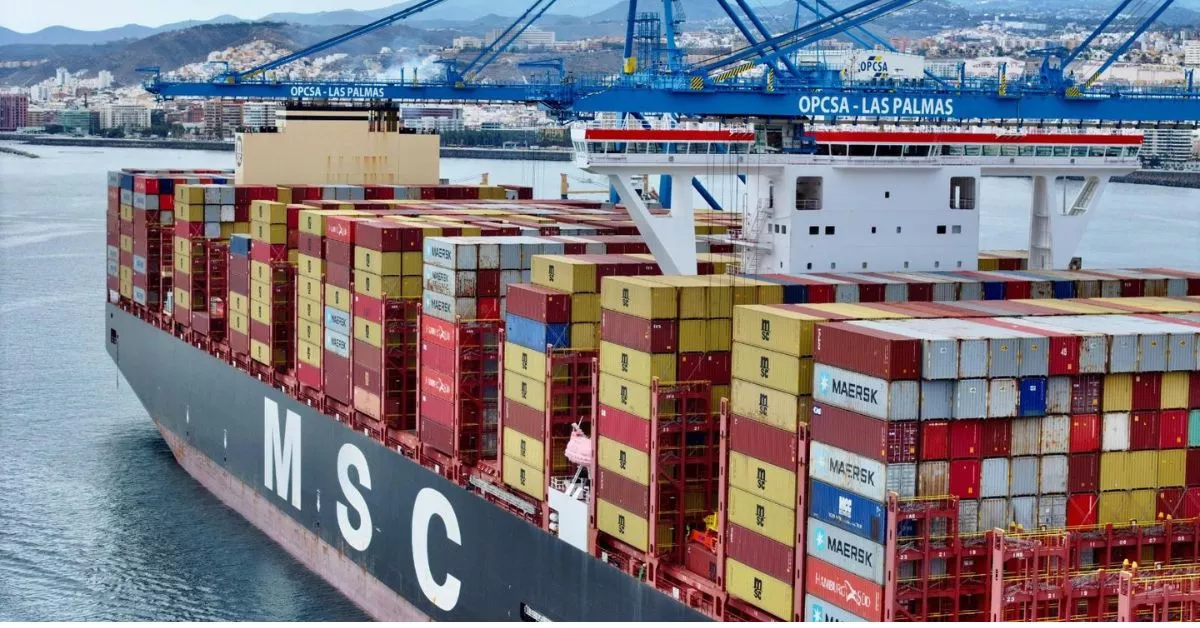
The Gross Domestic Product (GDP) per capita in the Canary Islands has advanced more than the Spanish average in the last two years, indicating it is beginning to converge after drifting by up to 25 points since the turn of the century, when both were on par. This is one of the conclusions of the publication ‘The Canary Economy in Graphs 2023-2024′, commissioned by CEOE Tenerife from the consultancy Corporación 5, supported by Caixabank, and presented on Monday by the president of the employers’ association, Pedro Alfonso, the director of the consultancy, José Miguel González, and the territorial director of the financial entity, Manuel Afonso.
The GDP per capita of the Canary Islands in 1999 was virtually the same as the Spanish average, specifically at 99.8%; it fell to 75% in 2022, and with the economic recovery following the pandemic, the gap has narrowed to 79.3% compared to the national average, as reflected in this annual publication. However, José Miguel González emphasised that, despite this shift in direction, in the last two years “the indicator continues to reflect a worrying trend” because structural differences persist, particularly when compared to the European Union. In fact, in comparison with the GDP per capita of eurozone countries, the Canarian figure stands at 59.8%, rising to 64.8% relative to the 27-member Europe.
The study indicates that the GDP of the Canary Islands in 2024 is around €58 billion, that productivity has grown without job losses, “which represents a significant qualitative change,” and that unemployment, which peaked at 33% in 2013, stood at 13.8% in December 2024, “a notable improvement” that still falls short of the minimum of 9.7% achieved in 2007, explained González. He also pointed out that wages have improved in line with the increase in productivity, but warned of a concerning rise in absenteeism, which has increased more than in the rest of the country.
From a fiscal perspective, the Canary Islands have experienced an increase in tax revenues derived not only from greater economic activity but also from higher tax rates, González added, noting that the weight of the public sector in the economy continues to grow and now stands at 21%, compared to 17% before the pandemic. Regarding population trends, the study highlights that the Canary Islands maintain their demographic vitality, but there is a gradual aging and deterioration of natural growth, leading to an increase in the dependent population.
Pedro Alfonso, the president of CEOE Tenerife, considered that this report reflects steady economic growth and a favourable macroeconomic situation, but warned of the need to address the structural issues of the islands, such as low productivity, and the divergence with Europe, regarding which “we are becoming increasingly poorer”. He also warned of the risk posed by rising tax pressure, which can disincentivise investment or hinder business development. Another concern for the business leader is the impending conclusion in 2026 of the European Next Generation funds, whose implementation, in his view, has not effectively reached the real economy, leading to questions about what will happen when this economic boost disappears.
Alfonso called for a commitment to improving productivity, both in the public and private sectors, and requested the collaboration of trade union representatives, as “a more efficient economy benefits us all”. He also pointed out the inconsistency in having 150,000 people unemployed while there are 60,000 job vacancies in the Canary Islands, an issue for which CEOE has commissioned a study from Corporación 5 to identify the causes, citing housing as a possible factor.
Manuel Afonso, the territorial director of CaixaBank in the Canary Islands, highlighted that the economy of the Archipelago is evolving reasonably positively, despite existing uncertainties in the international environment. He explained that the GDP in the Canary Islands grew by around 4% in 2024 and is expected to grow by 3% in 2025, placing the Canary Islands among the most dynamic regions in the country. “We are receiving record numbers of tourists; this is the moment to capitalise on this positive cycle to address structural issues such as housing and infrastructure,” he asserted. The CaixaBank representative stated that housing sales, mortgage acquisitions, consumption, and overall market activity are maintaining solid advances.















